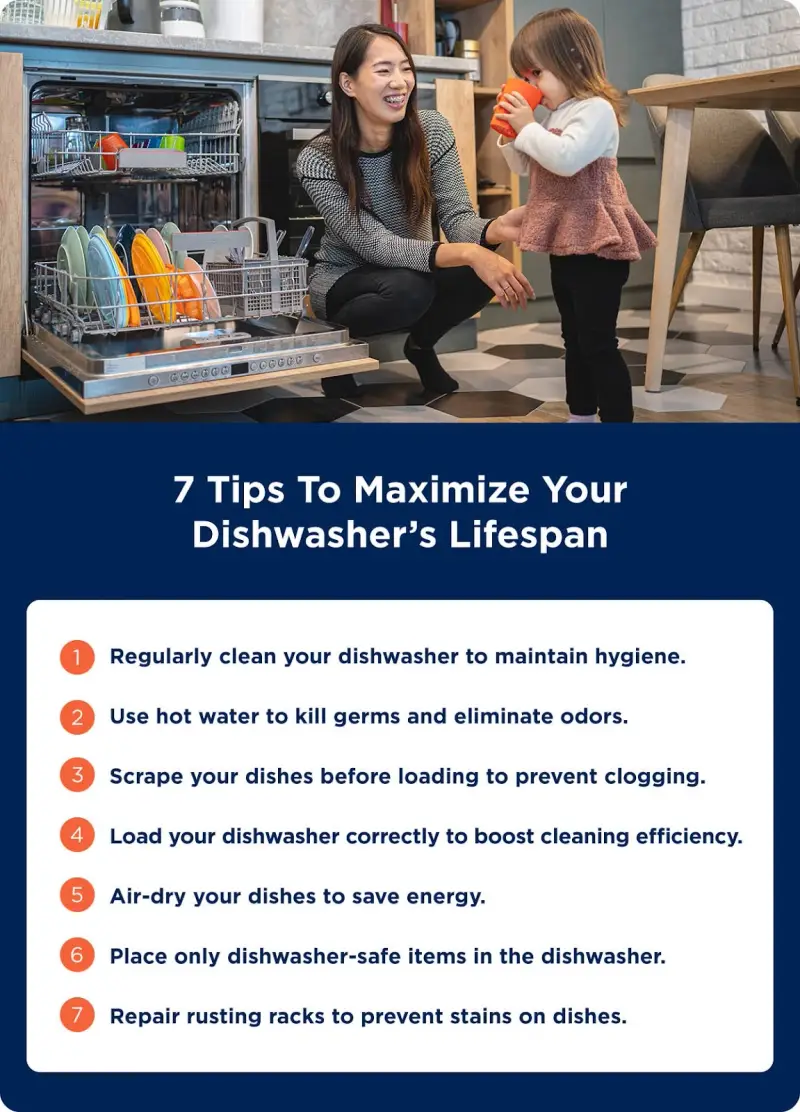How Long Do Dishwashers Last? Will Yours Croak Soon?

|
How long do dishwashers last? Dishwashers typically last nine to 16 years, with an average life expectancy of 12 years. Dishwasher lifespan is relatively predictable, but your machine is much more likely to reach that 16-year mark if you take care of it properly. |
Ever wondered how long dishwashers last? It’s a natural question that comes up when you’re on the hunt for your perfect kitchen companion. Imagine a world where your dishes are sparkling clean without any effort, giving you extra time to juggle other chores around the house. That’s the magic of a good dishwasher!
If you’ve never researched or implemented any dishwasher maintenance over the years, you’re missing out on some important information that could help extend the life of your current appliance. To help you get the most efficient and long-lasting use out of your dishwasher, the experts at Mr. Appliance® have put together some helpful tips about how to maximize your dishwasher’s efficiency and longevity.
How Long Should a Dishwasher Last?
Many factors influence how long a dishwasher lasts. When you move into a new house, you might know how old the dishwasher is but not if it was well-maintained. On the other hand, you can get an idea of how long a new dishwasher will last by checking its manual.
There are many different brands of dishwashers available today. Check out the life expectancy of some well-known dishwasher brands:-
- Bosch, KitchenAid, Whirlpool, and Samsung can last up to ten years.
- Frigidaire, Kenmore, and Electrolux can operate for more than ten years.
- Miele can work for up to 20 years.
The following factors influence the longevity of your dishwasher:
- Frequency of usage: More than a quarter of U.S. households use a dishwasher four or more times per week, according to the U.S. Energy Information Administration. Those who use their appliance less frequently will likely need fewer repairs and get more years out of their dishwasher.
- Quality: If you purchased a high-quality dishwasher from a trusted manufacturer, it may last longer than some of the older models. Plus, you’re likely to experience fewer problems like loud dishwasher noises and inefficient water use.
- Maintenance: Keeping up with regular maintenance can make your dishwasher last longer and work better. Invest time and energy into cleaning it regularly to prevent buildups or blockages.
- Repairs: The professionals you choose to repair your dishwasher make a difference. If you hire a dishwasher repair expert who is trained and experienced and uses OEM parts, your dishwasher will continue to run efficiently and last longer.
Read our guide on how long appliances usually last to figure out if you can still use an appliance or if it's time to replace it.
7 Tips To Maximize Dishwasher Lifespan
You do have some control over how long your dishwasher will last. Practice these seven effective tips to maximize the working life of your dishwasher:

1. Keep It Clean
With regular use, a dishwasher’s cleaning power becomes less effective as some internal parts become dirty or greasy. Residue buildup can even cause your dishwasher to become clogged or broken.
Every month, clean the door seals and any food spills with mild soap, warm water, and a soft cloth. You should also clean the food trap and filter. Regular cleaning helps fight foul odors in your dishwasher and keeps your dishwasher running smoothly.
2. Opt for Hot Water
Use hot water when washing dishes in a dishwasher to help kill germs, foul odors, and bacteria. According to the FDA, home dishwashers should be set to 120°F or higher to sanitize dishes. Fortunately, they're usually set between 130°F and 170°F.
Plus, hot water helps prevent damage to the machine parts by dissolving detergent properly. When detergent fully dissolves, it effectively breaks down and removes food particles and grease from dishes, preventing drain clogging.
3. Scrape Food Off Your Dishes
Scrape your dishes to remove large food chunks before placing them in the dishwasher. Food scraps and debris can become trapped in the filter and reduce the cleaning power of the dishwasher. Larger items like bones can cause a clog or damage to moving parts.
4. Don't Overfill
Loading your dishwasher correctly can increase the cleaning efficiency of each wash cycle. Leave gaps between each dish and opt for a second load if you have a lot of dishes. The gaps make it easier for water and detergent to reach each surface and properly wash your dishes. The extra space also prevents dishes from hitting each other and more fragile dishes from chipping or breaking.
Keeping a manageable load also reduces the strain on your machine. Refer to the dishwasher's user manual if you're not sure how to put dishes in the right way.
5. Let your Dishes Dry Naturally
If you have time to spare, consider air-drying your dishes instead of using the heat cycle of your dishwasher. You can either use your dishwasher’s air-dry cycle or crack open the door to let your dishes dry on the rack.
The heat cycle often uses more energy, puts extra pressure on the appliance, and can cause delicate dishes to break or fade in color over time. Air drying is a safer and gentler way of drying at room temperature. Plus, cutting down on dishwasher usage can help you save electricity.
6. Be Selective
Your dishwasher can wash a lot of things, but remember that not everything can go in the dishwasher. Some items can melt or even release harmful chemicals when exposed to high heat.
Before placing items in your dishwasher, double-check their labels to ensure they are dishwasher-safe.
7. Repair Rusting Racks
Address rusty racks right away to avoid damage. When racks start to rust, they develop sharper edges that might scratch and stain your dishes. Rust particles can even go inside the dishwasher and cause damage like clogs or water spray inefficiencies.
When To Repair a Dishwasher
If your dishwasher shows certain problems, it might just need a simple fix or a part replacement rather than a full replacement. If you're not sure what to do next, it's best to consult with an appliance professional, like the service pros at your local Mr. Appliance. They can help you decide whether to repair or replace your dishwasher.
Here are some situations where repairing your dishwasher is the right choice:
- Visible rust: If you start noticing rust on small surfaces, you can attempt to clean the rust yourself or contact an appliance professional for assistance. A professional can also help you assess the extent of the rust and any additional repairs needed.
- Unusual loud noises: Don’t ignore banging or humming noises coming from your dishwasher. It could be a sign of your dishwasher’s motor failing or another part that needs replacing.
- Unclean dishes after the wash cycle: If your dishes have stains or food residue after the wash cycle, you may have a blockage in your spraying arm, worn-out parts, or a burned-out heating element.
- Drainage issues: If water isn't draining from the dishwasher, you can repair the faulty parts rather than replacing the whole appliance. This usually happens when the drain line is blocked or certain parts, like the drain solenoid or impeller, are worn out.
- Extended wash cycles: If your appliance is taking too long to wash the dishes, it could be because of a defective thermostat. To replace this, you’ll need to disconnect your dishwasher and, depending on your model, turn it on its side to reach the thermostat.
- The dishwasher does not fill with water: This issue could be due to a faulty valve or clogged filter.
- A dishwasher is leaking: A leaking dishwasher may be a sign of using incompatible soap or one of several parts needing a replacement (like the door gaskets or spray arm).
When To Replace a Dishwasher
There are times when repairing a dishwasher is no longer practical, and replacing it becomes the better option. Here are some key indicators that it's time to invest in a new dishwasher:
- Age and personal preferences: If your dishwasher is more than 10 years old, it may be time to get a new model. A new dishwasher may also make sense if you want specific features or styles your current one doesn’t have.
- Unavailability of certain parts: Older models can be challenging to service if replacement parts are tough to find. Depending on your preference, it may be easier to simply purchase a newer model so you can more easily replace the parts when needed.
- More energy and water usage: Some dishwashers naturally use more energy or water than others, even if they’re functioning properly. You can cut down on your usage by finding a newer, more energy- and water-efficient model.
Help Your Dishwasher Last Longer With Routine Maintenance
Now you know how long dishwashers last and how to keep them working as long as possible. Your dishwasher is just like any other household appliance and demands regular maintenance. With proper care, your dishwasher will work up to its maximum lifespan.
You can trust Mr. Appliance for dishwasher repair and maintenance to ensure peak dishwasher durability and efficiency.
Schedule an appointment online today or connect with your local Mr. Appliance team for service.
FAQ About How Long Dishwashers Last
Have more questions related to dishwashers? Don't worry — we've got the answers you need.
How Often Should You Replace Your Dishwasher?
You should replace a dishwasher every nine to 16 years, depending on its current state. Ongoing maintenance, along with the brand, model, and usage, can influence how long your dishwasher can last before needing a replacement.
Is It Worth Repairing a Dishwasher?
It’s worth repairing a dishwasher if it’s less than nine years old and needs minor repairs. A dishwasher may reach the end of its lifespan between nine and 16 years. At that time, you can consult an appliance professional to see whether repairing or replacing it is the best option.
How Do You Know Your Dishwasher Is Dying?
Your dishwasher may be dying if it’s old and continuously breaks down, even after multiple repairs. A professional can help you determine whether your dishwasher needs a replacement, or if repairs will help extend its use.
 Click to call
Click to call


